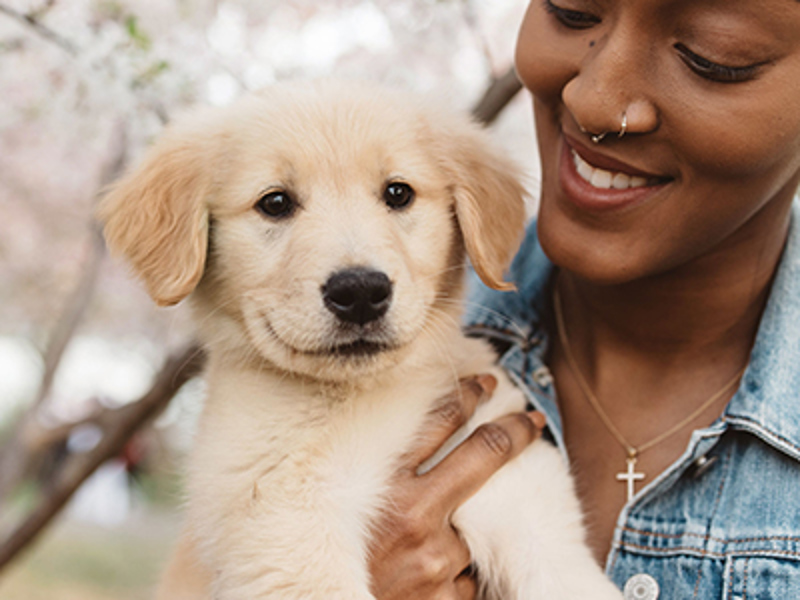
Spaniel (English Springer)
Breed characteristics
- Size
- Medium
- Exercise
- More than 2 hours per day
- Size of home
- Small house
- Grooming
- More than once a week
- Coat length
- Medium
- Sheds
- Yes
- Lifespan
- Over 10 years
- Vulnerable native breed
- No
- Town or country
- Either
- Size of garden
- Large garden
About this breed
The English Springer is the highest on the leg of all the Land Spaniels and he shares the same ancestry as the other spaniels. When classification took place, selective breeding for size and colour followed and that stabilised type. At one stage the breed was called the Norfolk Spaniel as it was reputed that the Duke of Norfolk developed the breed. The Springer Spaniels earned their name by their practice of 'springing' forward to flush the game into nets. After the invention of guns, the breed was used to flush game from undergrowth. The liver and white colour is the most popular but black and white and tri-colours occur in lower numbers. The English Springer is the most popular of the spaniels for working in the field.
Images for this breed
The Gundog breed group
Dogs that were originally trained to find live game and/or to retrieve game that had been shot and wounded. This group is divided into four categories - Retrievers, Spaniels, Hunt/Point/Retrieve, Pointers and Setters - although many of the breeds are capable of doing the same work as the other sub-groups. They make good companions, their temperament making them ideal all-round family dogs.
Colour Watch
Category 0: Breeds with no NBS colour registration options.
Read more about Colour Watch.
Breed Standard colours
Breed standard colour means that the colour is accepted within the breed standard and is a traditional and well-known colour in this breed.
Breed standard colours in this breed include:
- Black & White
- Black White & Tan
- Liver & White
- Liver White & Tan
Other colour/s
'Other' means you consider your puppy to be a colour not currently known within the breed and one that does not appear on either the breed standard or non-breed standard list. In this instance you would be directed through our registrations process to contact a breed club and/or council to support you on identifying and correctly listing the new colour.
Non-breed-standard colours
Non-breed-standard colour means that the colour is not accepted within the breed standard and whilst some dogs within the breed may be this colour it is advised to only select a dog that fits within the breed standards for all points.
Colour is only one consideration when picking a breed or individual dog, health and temperament should always be a priority over colour.
Health
Whether you're considering buying a Spaniel (English Springer) puppy or breeding from your dog, it's important to understand the health issues that may affect the breed and how they can be managed or avoided.
Pre-breeding health screening
Good Practice schemes and tests
We strongly recommend that breeders, at a minimum, conduct these tests before breeding, as evidence indicates these conditions are a significant concern in the breed.
- Prioritising genetic diversity
- Elbow testing (for elbow dysplasia) using the BVA/KC Elbow Dysplasia Scheme
- Eye testing (and gonioscopy for PLA) using the BVA/KC/ISDS Eye Scheme
- Hip testing (for hip dysplasia) using the BVA/KC Hip Dysplasia Scheme
Best Practice schemes and tests
These tests address conditions that are still significant for the breed, though they may not be as critical as those listed under Good Practice. They might be less common or newly identified, and research is ongoing to determine their full impact.
To support the breed’s health, responsible breeders should ensure they complete all tests in both categories. Following our Best Practice guidelines means completing both the Good Practice and Best Practice tests for your breed.
- DNA test for Acral mutilation syndrome (AMS) - Find a list of tested dogs here
- DNA test for Dyserythropoietic anemia and myopathy syndrome (DAMS) - Find a list of tested dogs here
- DNA test for Fucosidosis (fuco) - Find a list of tested dogs here
- DNA test for Phosphofructokinase deficiency (PFK) - Find a list of tested dogs here
- DNA test for Progressive retinal atrophy PRA(cord1) - Find a list of tested dogs here
Click here to find out more about The Kennel Club's health standard
Find out about a particular dog's results
Please visit our Health Test Results Finder to discover the DNA or screening scheme test results for any dog on The Kennel Club's Breed or Activity Register.
You can also view the inbreeding coefficient calculation for a puppy's parents, or for a dog you're thinking of breeding from.
DNA testing services
To support your health testing journey, we provide our tailored Spaniel (English Springer) Breed-Specific DNA Package. Giving you the information you need about potential health risks, this package includes screening for Acral mutilation syndrome (AMS), Fucosidosis (Fuco), Phosphofructokinase deficiency (PFK), Progressive retinal atrophy (PRA cord1), DNA Profile (SNP - ISAG 2020).
5 essential tests valued at £295 for just £150, that screen for multiple conditions at once, saving you time and providing vital health information. 
Breed health & conservation plan
The Breed Health and Conservation Plans
Our breed health and conservation plans (BHCPs) use evidence and data to help us understand the health issues found in each pedigree dog breed. These plans help breeders and owners identify health and welfare problems and use information, health tests and health schemes to avoid passing on those problems to future puppies. They also support and provide breeders with tools and specialist expertise to help manage genetic diversity, understand the impacts of close breeding, and find the best ways to preserve the population of their breed.
Working together for the breed
We’ve worked with breed clubs and breed representatives to gather all available evidence to help us determine the priority concerns for the breed and decide how we can work together to manage and reduce these problems.
Breed priorities
The current key priorities for the breed are:
- Genetic diversity
- Breed health education
- Engaging in further research
How we plan to make improvements
We’ve agreed the following list of actions with the breed clubs to improve the health of the breed. Both parties are committed to working on these areas and will review these on a regular basis to ensure the actions remain focussed and relevant to the breed’s health.
Breed club actions include:
- The breed clubs to provide husbandry advice (particularly ears, teeth and weight) on the English Springer Spaniel health website
- The breed clubs to investigate avenues into incomplete ossification of the humeral condyle (IOHC) research, with the Kennel Club to assist in recruitment of dogs – IN PROGRESS (information about the ongoing IOHC research can be found here)
- The breed clubs to continue to engage in research opportunities for their breed – ONGOING
Our actions include:
- To investigate the possibility of directing traffic through the Breed Information Centre to the English Springer Spaniel health website – COMPLETE (this action was completed in 2020, with a link available above)
- To keep the breed updated on any advancements in a cruciate ligament study
- To share the findings of the popular sire study– IN PROGRESS (We are undertaking a complete review of every breed’s population analysis, which will be released once finalised)
- To investigate formulating breeding advice regarding the consequences of close breeding and genetic diversity – IN PROGRESS (this will be included in the action above)
The full evidence base is available at the discretion of the breed clubs, however if you would like to seek access to the full report, please contact our health team here.
Health and Breeding Support Team (The Kennel Club)
How do I use this information?
Breeders should be mindful of the top priorities in their breed and ensure they are working to reduce and eliminate the presence of these diseases when choosing to breed their dogs.
Puppy buyers should also be aware of these issues and be sure to ask their breeder how they are contributing towards the above actions, and whether any of these problems have been seen in their breeding lines.
More about health
If you have any concerns about a particular health condition in your breed then you may wish to speak to your vet or you could contact your breed health co-ordinator.
Breed health co-ordinators are individuals working on behalf of breed clubs and councils who are advocates for the health and welfare of their chosen breed. They acts as a spokesperson on matters of health and will collaborate with The Kennel Club on any health concerns the breed may have.
To contact your breed health co-ordinator please email either
or
Lesley FieldFind out more about health issues in this breed by visiting the UK English Springer Spaniel breed clubs' health website.
Breed watch
Category 1
Currently no points of concern specific to this breed have been identified for special attention by judges, other than those covered routinely by The Kennel Club breed standard.
Breeding restrictions
There are a number of The Kennel Club's rules and regulations that may prevent a litter from being registered, find out about our general and breed specific breeding restrictions below.
More about breeding
There are not currently any additional breed specific restrictions in place for this breed.
Looking for a puppy?
Looking for a Spaniel (English Springer)? Explore our list of puppies and rescue dogs for sale near you.
More information

Need to find out more about a breed?
Use our Find a Club service where you can locate breed clubs that can offer support and advice.

Use our Find a Puppy service
The Kennel Club's Find a Puppy service provides contact details for breeders who have puppies available. Let's help you find your new best friend.

Get the best lifetime pet insurance
At Kennel Club Pet Insurance, we want you to focus on getting the best possible treatment for your dog without worrying about the cost.
